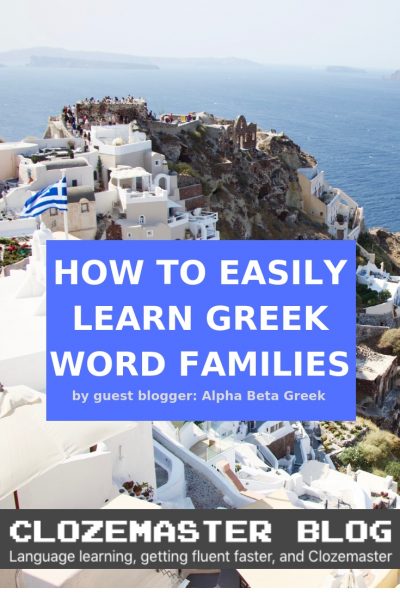
When Elize was learning new vocabulary, I remember that she would always place a notebook with a big list of words in front of her.
She was meticulously noting everything down: words from her course book, from the songs she was listening to lately or words she heard me say during our lesson.
Despite her best efforts and her apparently great organization skills, she would suddenly say: “I can’t remember them. These words won’t stick!”.
She’d get frustrated. At times, she was exasperated.
The truth was that Elize had come a long way: she had a good grammar foundation, and almost always gave correct answers in the grammar exercises. She could now read and understand short passages.
But what was going on with her expression? Why couldn’t she remember new vocabulary and use it in her sentences?
Difficult questions, especially for a novice teacher.
At the time, my knowledge of teaching new vocabulary wasn’t far from the typical learning strategy: write down the words in Greek and your native language, read them aloud, memorize them, repeat.
Over and over, until they “stick”. Or, make flashcards with the words, memorize them, repeat.
You see the problem here?
Finding meaning
As much as I wanted to help Elize, I couldn’t. This method didn’t work for her. She was learning, yes, but much slower. And the worst thing was that she was blaming her “bad memory”.
It wasn’t long after when we tried something different: Elize or I would read the word in the flashcard, then make a sentence with it.
It comes as a no-brainer right now, but back then I felt the excitement of trying something different and eventually seeing results from it.
Putting each word in context helped Elize to understand the definition.
The words weren’t fragmented anymore, stripped of their richer meaning.
Her brain was making associations between the new and the surrounding words: These acted as support for the new, giving Elize the ground to build a whole, meaningful sentence.
And it was like that, sentence by sentence, that Elize started remembering new words and feeling thrilled about it.
In teaching, however, one should never rest.
Looking back at Elize’s lesson, I’m wondering what were the exact words she had trouble with? Words that sound the same? Words that end in the same way? Or, even more complicated than that, words deriving from the same root?
I’ll never know. Probably all of the above.
It’s true however that word families – words deriving from the same root – do cause trouble when memorizing. And it happens more frequently than we think.
More often than not, we say a slightly different version of the word we had in mind. And the meaning is usually beyond slightly different.
I have quite a few anecdotes to tell with me getting confused with words from the same word family in English or French, resulting in laughter or misunderstandings.
It makes sense for a learner, and especially a learner of Greek. Words derived from the same root need in-depth learning that we can’t find in simple flashcard memorization or aimless repetition.
All of the following needs to be understood:
- the Greek prefixes and suffixes,
- the different endings of grammar persons for verbs,
- the different endings of nouns depending on the case they’re in (nominative, accusative etc.),
- the number (singular, plural) and even,
- the grammar gender (masculine, feminine, neuter).
Let’s look at an example.
Make associations
How about the verb μαθαίνω [maθéno]?
If you’ve been learning Greek for a while, you already know that this is the verb “to learn” (first person, present tense).
The root is μαθ- and gives us the following words, among others:
- η μάθηση (learning, education)
- ο μαθητής (learner)
- ο μαθητευόμενος (apprentice)
- η μαθητεία (apprenticeship)
- το μάθημα (lesson)
- η εκμάθηση (learning, acquisition)
- η αμάθεια (ignorance)
- το μαθητούδι (schoolchild)
At first glance, you might think that this seems incredibly confusing and you’re right; learning these words without a clear purpose won’t help you understand the differences, especially the subtle ones such as in μάθησηand εκμάθηση, for example.
But we can actually use the benefit of grouping together these common root words and start with a mind map. Word families fit extremely well with this practice.
Mind maps have gained lots of praise in education and with good reason: they help us analyze, categorize and see the whole picture at once.
Instead of following a linear, rigid process to learn new words, we can use mind mapping to add meanings and examples.
Your story
In Elize’s story, I explained how adding the words to sentences made a difference to how Elize was retaining vocabulary.
What takes this a step further is creating meaningful examples. This increases the chances of remembering the word and boosts your confidence.
The reason why this happens is that the learner participates actively in the process of learning, by bringing their personal experience and memories in their study.
For example, when you learn the word μαθητεία in a sentence, think next how you can change it to match your own experience – your own story.
Chunks and patterns
Context, as in creating sentences and learning the language in “chunks”, holds another benefit:
We might not always realize it, but as we learn more and more complex vocabulary, we also identify patterns, such as similar word endings, similar affixes and also similarities in spelling and accent.
For example, you can identify how the ending -ούδι refers to someone young (and when you run into other words such as ανηψούδι or αγγελούδι, you understand part of their meaning).
Imagine you just learned a traditional vocabulary list with 10 words ending in -ούδι. Wouldn’t that be confusing?
Even so, by understanding how this pattern works and by adding context, you get a greater chance in retaining such closely related words.
To recap…:
Root words and word families might be a challenging learning experience, but one you can use for your own benefit:
- start with making a mind map to fit in all your words
- don’t stick to vocabulary lists – instead, use the words in meaningful sentences
- notice patterns and use them to expand your learning
Happy Greek learning 🙂
Learn Greek in context with ClozemasterClozemaster has been designed to help you learn the language in context by filling in the gaps in authentic sentences. With features such as Grammar Challenges, Cloze-Listening, and Cloze-Reading, the app will let you emphasize all the competencies necessary to become fluent in Greek. Take your Greek to the next level. Click here to start practicing with real Greek sentences! |


